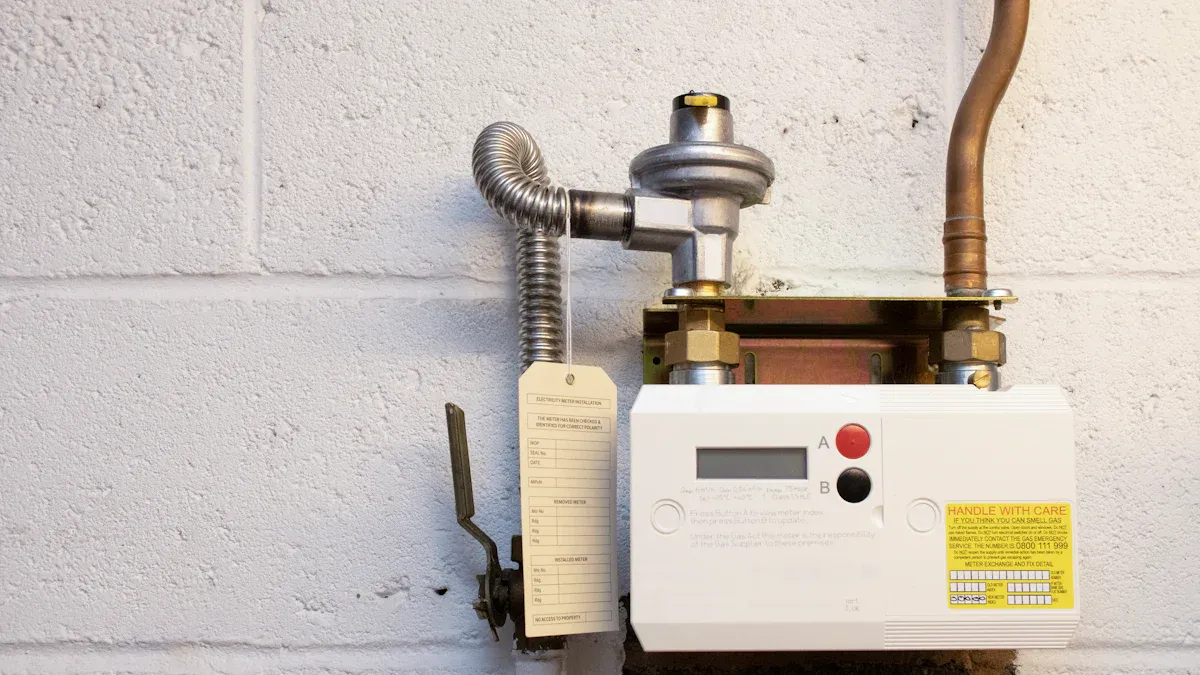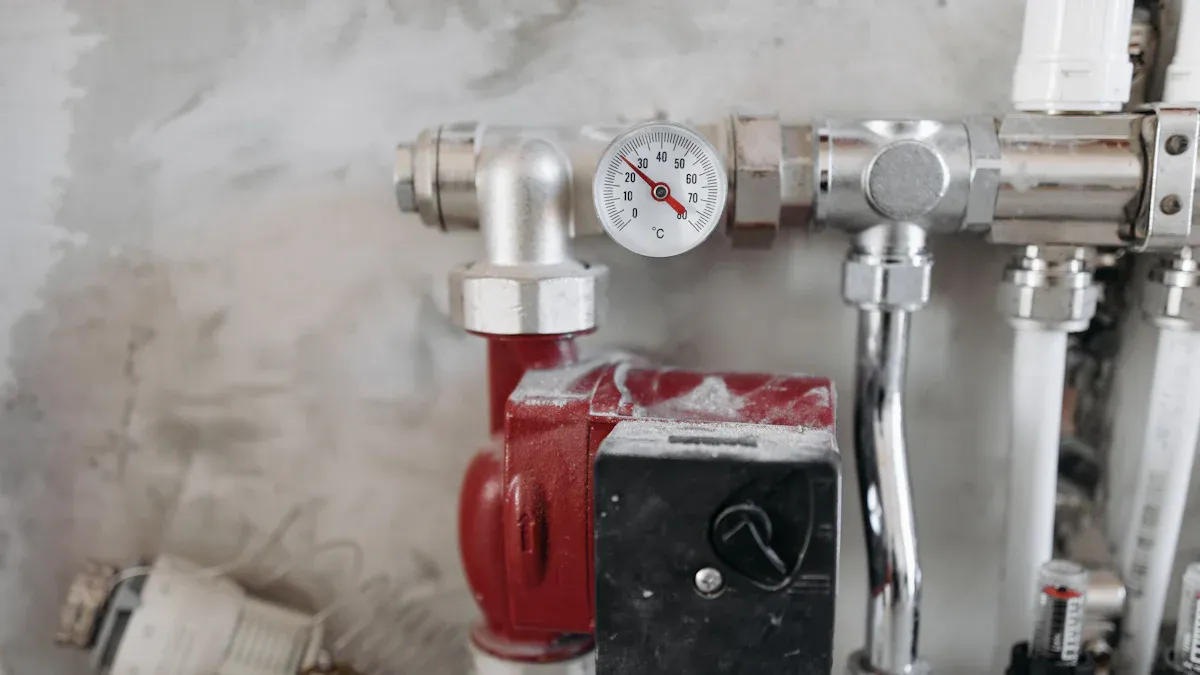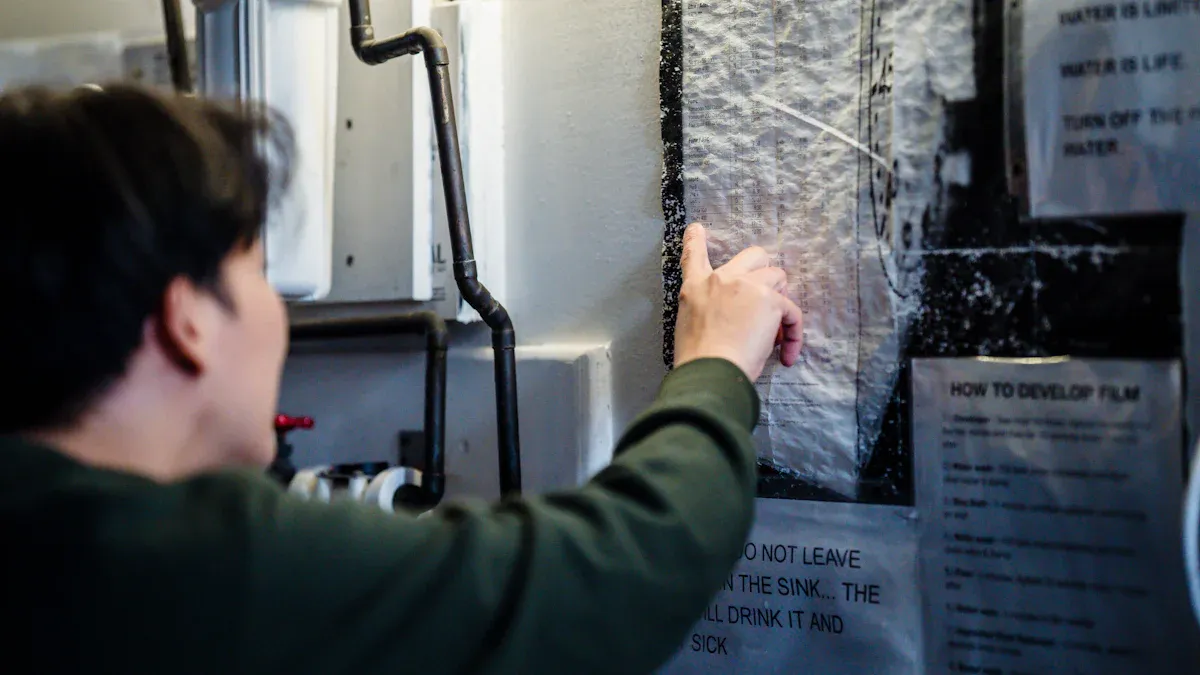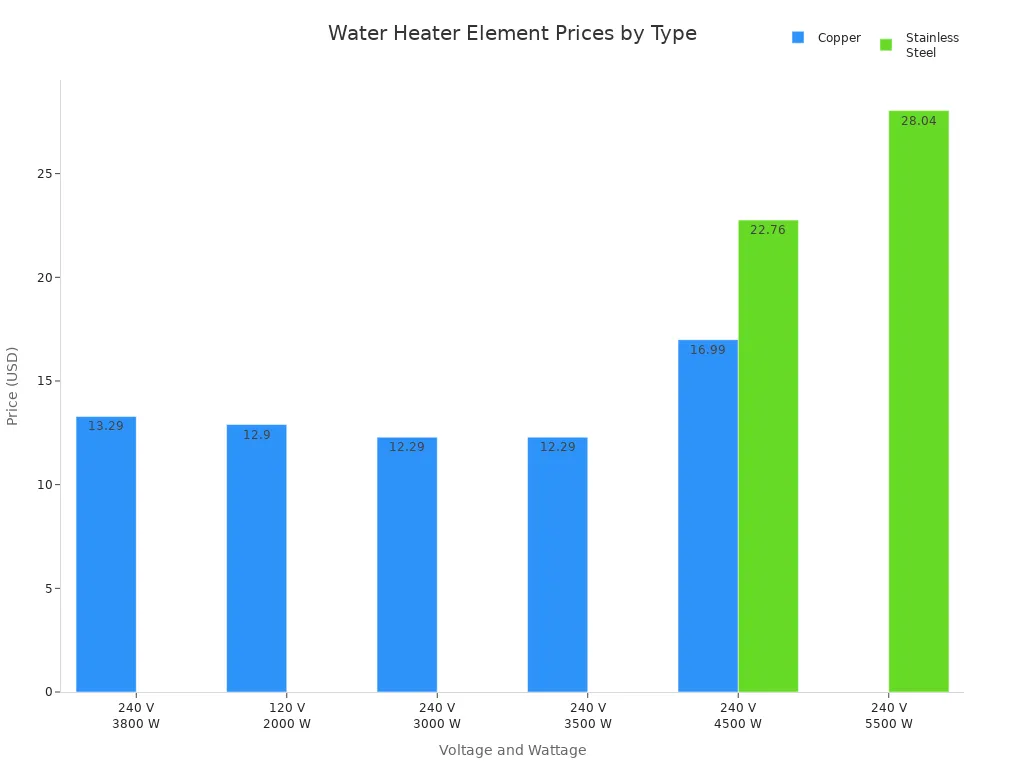
Choosing the right water heater element involves several key factors. Consumers should consider the type of immersion water heater, its compatibility with their system, and its efficiency. Factors like durability and cost also play a significant role in the decision-making process. For instance, 40% of households in the U.S. opt for electric water heaters, highlighting the importance of selecting a suitable water heater heating element for energy savings and performance. Ultimately, understanding the various water heating elements available can help ensure optimal functionality and longevity.
Key Takeaways
- Check compatibility with your water heater model to ensure proper function.
- Choose elements with high energy efficiency ratings to save on utility bills.
- Select durable materials like stainless steel for longer-lasting performance.
Types of Water Heater Element

When it comes to water heater elements, several types stand out, each with unique features and benefits.
Copper Elements
Copper water heater elements are known for their excellent heat transfer efficiency. They heat water quickly due to their high thermal conductivity. Here are some advantages and disadvantages of copper elements:
-
Advantages of Copper:
- Quick heating capabilities.
- Good corrosion resistance in most conditions.
- Natural properties help prevent bacteria growth.
- Long-lasting durability.
-
Disadvantages of Copper:
- Can corrode in highly acidic or alkaline water.
- Higher initial costs and repair expenses due to specialized techniques.
| Feature | Copper Water Heater Elements |
|---|---|
| Heat Transfer Efficiency | Excellent due to high thermal conductivity |
| Corrosion Resistance | Good, but can corrode in acidic or alkaline water |
Stainless Steel Elements
Stainless steel elements offer exceptional corrosion resistance. This material undergoes a process called passivation, forming a protective oxide layer. This layer not only prevents corrosion but can also self-heal if damaged. As a result, stainless steel elements often require minimal maintenance for over 30 years, making them ideal for reliable performance.
Tip: If you live in an area with hard water, stainless steel elements can be a great choice due to their durability and longevity.
Glass-Lined Elements
Glass-lined water heater elements are particularly beneficial in hard water conditions. The glass lining acts as a protective barrier, preventing the water from coming into direct contact with the metal tank. This feature is crucial for maintaining water quality and reducing scale formation.
| Benefit | Description |
|---|---|
| Corrosion Resistance | The glass lining prevents direct contact with metal, crucial in hard water conditions. |
| Improved Water Quality | Keeps water away from metal surfaces, reducing metallic taste or odor. |
| Reduced Maintenance Needs | Extends the lifespan of the water heater, leading to fewer repairs or replacements. |
Choosing the right type of water heater element can significantly impact your system’s efficiency and longevity.
Water Heater Element Compatibility
When selecting a water heater element, compatibility with your existing system is crucial. If the element doesn’t fit your water heater model, it won’t work effectively. Here’s how to ensure you choose the right one.
Identifying Your Water Heater Model
Start by determining your water heater model. This step helps you find the correct replacement element. Here are a couple of things to check:
-
Determine your Element Flange Style: Identify the type of flange your water heater uses. Common styles include:
- Screw-In
- Flat
- Universal
- Round Head
-
Determine your Voltage/Wattage: Check the voltage and wattage rating of the element. Most residential heaters operate at 240 volts, while smaller or point-of-use heaters may use 120 volts.
By knowing these details, you can narrow down your options and avoid purchasing an incompatible water heater element.
Matching Element Specifications
Once you identify your water heater model, the next step is to match the specifications of the replacement element. Here are the critical specifications to consider:
| Specification | Details |
|---|---|
| Element Flange Style | Must match the existing element’s flange style. |
| Voltage/Wattage | Typically, 240v for most residential heaters; 120v for smaller or point-of-use heaters. |
| Watt-Density | Wattage ratings vary; must match the original element’s wattage to ensure proper function. |
Matching these specifications ensures that your new water heater element operates efficiently and safely. A mismatch can lead to poor performance or even damage to your water heater.
By taking the time to identify your water heater model and match the specifications, you can make an informed decision. This approach not only saves you time and money but also enhances the longevity of your water heating system.
Water Heater Element Efficiency Ratings
When choosing a water heater element, understanding energy efficiency is vital. Energy efficiency ratings help homeowners gauge how well a water heater converts energy into heat. This knowledge can lead to significant savings on energy bills over time.
Understanding Energy Efficiency
Energy efficiency ratings, like the Uniform Energy Factor (UEF), measure how effectively a water heater operates. Here are some key points about UEF ratings:
- UEF ratings consider:
- Heat loss
- Standby energy loss
- Cycling losses
Higher UEF ratings indicate better energy efficiency. This means that a water heater with a high UEF will use less energy to heat water, which can lead to lower utility bills.
Tip: Always look for water heater elements with higher UEF ratings. They not only save energy but also reduce your overall costs in the long run.
How to Assess Efficiency Ratings
Assessing efficiency ratings before purchasing a water heater element is crucial. Here are some methods to help you evaluate these ratings:
- The UEF is the new standard for measuring energy efficiency in water heaters. It simplifies the selection process and allows for better comparisons across different brands.
- Updated Energy Guide labels will include performance information based on UEF, aiding consumers in their decision-making.
Understanding these ratings helps homeowners make informed decisions that align with their needs and budget. Here’s how energy efficiency ratings impact household energy consumption:
- Higher UEF ratings indicate more efficient water heaters.
- More efficient models lead to better energy savings over time.
- Choosing a higher efficiency model can result in lower long-term costs despite a higher upfront investment.
By focusing on energy efficiency, homeowners can select water heater elements that not only meet their heating needs but also contribute to a more sustainable and cost-effective home.
Water Heater Element Durability and Lifespan

When it comes to water heater elements, durability and lifespan are crucial factors. Homeowners want their investments to last, so understanding what affects these elements can help them make better choices.
Factors Affecting Lifespan
Several environmental and usage factors can impact how long a water heater element lasts:
- Temperature Extremes: Cold water entering the heater during winter increases the workload, which can shorten the lifespan.
- Humidity Levels: High humidity can lead to rust and corrosion, especially in poorly ventilated areas.
- Dust and Debris: Accumulation in garages or basements can affect components over time.
- Hard Water: High mineral content leads to sediment buildup, reducing efficiency and lifespan. Using a water softener can significantly extend the heater’s life.
- Usage Frequency: Larger households experience more wear and tear due to constant demand, while smaller households tend to have less strain, allowing for longer lifespans.
The average lifespan of water heater elements ranges from 6 to 12 years. However, this can vary based on the factors mentioned above.
Choosing Durable Options
Selecting the right material for your water heater element can enhance durability. Here are some of the most durable options available:
| Material | Durability Characteristics |
|---|---|
| Copper | Excellent thermal conductivity but prone to corrosion in hard water |
| Stainless Steel | High resistance to corrosion, ideal for hard water conditions |
| Incoloy | Withstands high temperatures and harsh water conditions |
Stainless steel and Incoloy elements resist scale and corrosion, reducing the need for frequent replacements. Given that over 85% of American homes experience hard water, choosing a durable option is essential for long-term performance.
By considering these factors and selecting the right materials, homeowners can ensure their water heater elements last longer and perform efficiently.
Water Heater Element Cost Considerations
When selecting a water heater element, cost is a significant factor. Prices can vary widely based on the type of element and its specifications. Here’s a breakdown of the price ranges for different elements:
Price Ranges for Different Elements
| Type of Element | Voltage | Wattage | Price |
|---|---|---|---|
| Copper | 240 V | 3800 W | $13.29 |
| Copper | 120 V | 2000 W | $12.90 |
| Copper | 240 V | 3000 W | $12.29 |
| Copper | 240 V | 3500 W | $12.29 |
| Copper | 240 V | 4500 W | $16.99 |
| Stainless Steel | 240 V | 4500 W | $22.76 |
| Stainless Steel | 240 V | 5500 W | $28.04 |
As you can see, copper elements generally cost less than stainless steel options. However, the initial price is just one part of the equation.
Evaluating Value for Money
When evaluating the value for money of a water heater element, consider several factors:
- Initial Purchase Price: The upfront cost of the element.
- Operating Costs: How much energy the element consumes over time.
- Installation Costs: Expenses related to installing the new element.
- Maintenance and Repair Costs: Ongoing costs to keep the element functioning.
- Lifespan and Warranty: How long the element lasts and what warranty it comes with.
- Energy Efficiency Ratings: Higher efficiency can lead to lower energy bills.
By weighing these factors, homeowners can make informed decisions. A more expensive element may save money in the long run if it lasts longer and operates more efficiently.

Choosing the right water heater element is essential for optimal performance and energy efficiency. Here are some key takeaways:
- Compatibility: Ensure the element matches your water heater model.
- Efficiency: Look for high energy efficiency ratings to save on bills.
- Durability: Select materials that withstand your water conditions.
Remember, making informed decisions today can lead to long-term savings and comfort in your home!
Post time: Sep-08-2025




